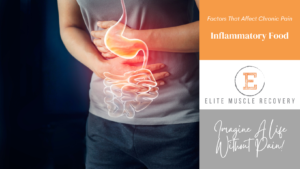“Tell me what you eat, and I’ll tell you what you are.” Anthelme Brillat-Savarin, 1826
Did you know certain types of food can keep your body in an inflammatory state and contribute to the effects of chronic pain and other chronic diseases?
Inflammation is when the body sends specific types of cells to defend against an irritant, and is an important part of the body’s immune response. Acute inflammation is the body’s normal response to an irritant, pathogen, or injury. Symptoms of acute inflammation can include pain, swelling, decreased function, redness, and heat. The immune system activates a cascade of specific cells that help with healing, and acute inflammation should resolve after a few days.
Chronic inflammation can occur for many reasons, and contributes to long term, widespread pain and fatigue. Chronic inflammation can contribute to many other chronic diseases, such as Type II diabetes, heart disease, and obesity. It is believed that chronic inflammation may also play a role in some cancers.
Regular and frequent intake of certain types of inflammatory foods are a risk factor for having chronic inflammation, disease, pain, and fatigue.
Eating the following foods can increase inflammation in the body:
- Candy – added sugars increase inflammation in the body
- Fast Food – contain trans fat, which is a trigger for inflammation
- Processed Meat – ex: hot dogs, bacon, sausage, lunch meat
- Snacks sweetened with refined sugar – ex: added white sugar, brown sugar, high fructose corn syrup
- Alcohol
- White Flour – flour found in white bread and white pasta has been stripped of its fiber and nutrients from the refining process
- Trans Fat – found in margarine, commercial baked goods, fried food, frozen pizza, refrigerated dough, shortening
- Battered, deep fried foods
- Soda
Many people focus on counting and restricting calorie intake for weight loss, but often overlook the types or quality of the food they are consuming. Simple awareness of food qualities can assist in reducing the effects of chronic pain by minimizing intake of foods that cause inflammation. Consider reducing consumption of the above mentioned foods if you are dealing with chronic inflammation and pain.
In conjunction with dietary adjustments, physical therapy can play an important role in reducing chronic inflammation and addressing chronic pain. For example, manual interventions such as dry needling and cupping can help reduce toxins in the body and bring muscles back into an acute inflammatory state to allow the body to bring healing cells to the painful areas. Specific stretching and strengthening activities after pain is managed can help get you back to doing the things you love with less limitation.
Stay tuned for Part 2 of this newsletter, where we will discuss the role of anti-inflammatory foods in addressing chronic pain and inflammation.
We would love to journey with you and help reduce your chronic pain and inflammation. Don’t let chronic pain hold you back any longer from doing what you love to do! Please reach out to Elite Muscle Recovery so we can help you decrease pain, improve function, and increase your quality of life!



